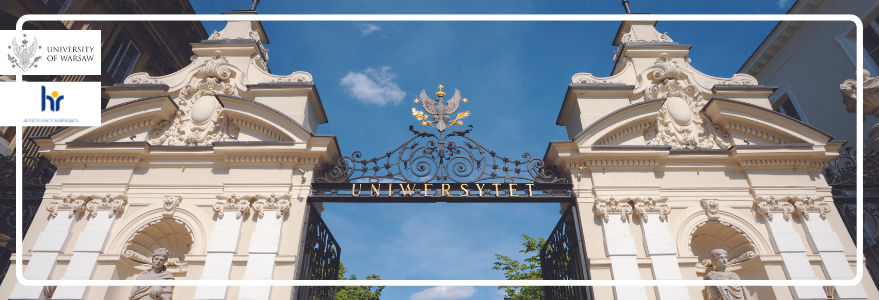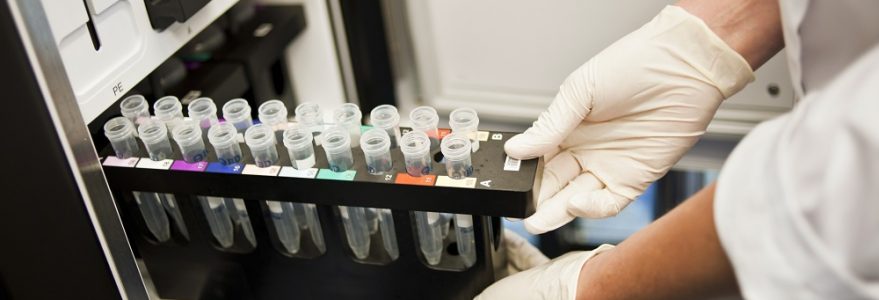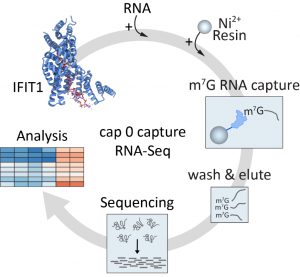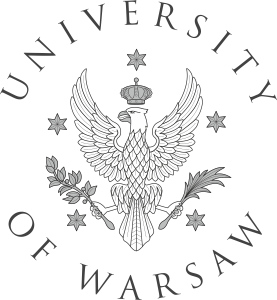The new academic year with the HR Excellence in Research
21 października 2022
This year the University of Warsaw will be receiving a visit from the European Commission’s experts to evaluate the UW’s actions under the Human Resources Strategy for Researchers. This information campaign is intended to present the HR Excellence in Research initiatives within equality, mobility, training and international funds.
The HR Excellence in Research is awarded to the research institutions that implement and adhere to the Human Resources Strategy for Researchers to develop high standards in the four below areas:
- ethical and professional aspects;
- recruitment;
- working conditions and social support;
- training.
The principles and requirements to be followed by researchers, research institutions and funding institutions are precisely described in the two European Union papers: the European Charter for Researchers and the Code of Conduct for the Recruitment of Researchers.
The HR Excellence in Research award is granted for a definite period. This year the University of Warsaw is in the award renewal phase.
“This year we are expecting a visit from experts of the European Commission who will evaluate the hitherto actions and accompanying measures, their impact on the university as well as their cohesion with the UW strategy. The experts will also meet representatives of the university community. The renewal of the HR Excellence in Research award is associated with its recognition among the members of our community,” Prof. Sambor Grucza, the UW Vice-Rector for Cooperation and Human Resources, said.
Following the June information campaign about the HR Excellence at the UW, actions and accompanying measures to be undertaken in the 2022/2023 are described below:
European Commission’s experts visiting the UW
Mobility, scholarships and programmes for UW doctoral candidates
Visits to strategic partner institutions
Reinforcing internationalisation
IDUB Programme and UW development
Survey of parents’ needs and other equality measures
More about HR Excellence in Research >>
Source: www.en.uw.edu.pl
The new method of preparing RNA for sequencing

Dr Maria Górna from the Faculty of Chemistry and her team developed a new method of preparing RNA for sequencing, which will facilitate the study of gene expression for many species of fungi, plants and eukaryotic microorganisms.
The Structural Biology Group, led by Dr Górna, studies the properties of human antiviral IFIT proteins. The team has developed new methods of selecting and enriching RNA, covered by a patent application filed in Poland, the USA and the EU.
The publication in the prestigious “Nucleic Acids Research” journal describes the first application of this invention to improve the sequencing of coding RNA using the example of baker’s yeast – a model organism in the study of gene expression and RNA metabolism. Dr Górna’s method consists in capturing and enriching the coding RNA by binding (of the IFIT1 protein immobilized on the resin) to the cap group at the 5 ‘end of the RNA – the so-called cap 0, which is present only at the ends of the mRNA. Non-coding RNAs are washed away and removed from the sample, thereby improving the quality of the sequencing data.
The analysis of the RNA enriched in this way was carried out in collaboration with the Laboratory of Translatomics IBB PAS under the supervision of Prof. Agata Starosta and proved that the new method successfully replaces commercial kits used for the preparation of mRNA samples. In addition, Dr Agnieszka Tudek from the Institute of Biochemistry and Biophysics, the Polish Academy of Sciences, and Prof. Rafał Tomecki from the Faculty of Biology, the University of Warsaw, showed that the previously known method based on another cap-binding protein is not suitable for yeast RNA samples.
This work in Dr Górna’s group was supported – among others – by the LIDER grant from the National Centre for Research and Development, Poland, and the EMBO Installation Grant.
Publication details
Martyna Nowacka, Przemysław Latoch, Matylda A. Izert, Natalia K. Karolak, Rafał Tomecki, Michał Koper, Agnieszka Tudek, Agata L. Starosta, Maria W. Górna, A cap 0-dependent mRNA capture method to analyze the yeast transcriptome, “Nucleic Acids Research”, 2022, DOI: 10.1093/nar/gkac903.

Graphics: The new method for mRNA enrichment based on the capture of Cap 0 groups on IFIT1 protein immobilized on a resin. Authors: Prof. Agata Starosta and Przemysław Latoch.
Source: www.en.uw.edu.pl

